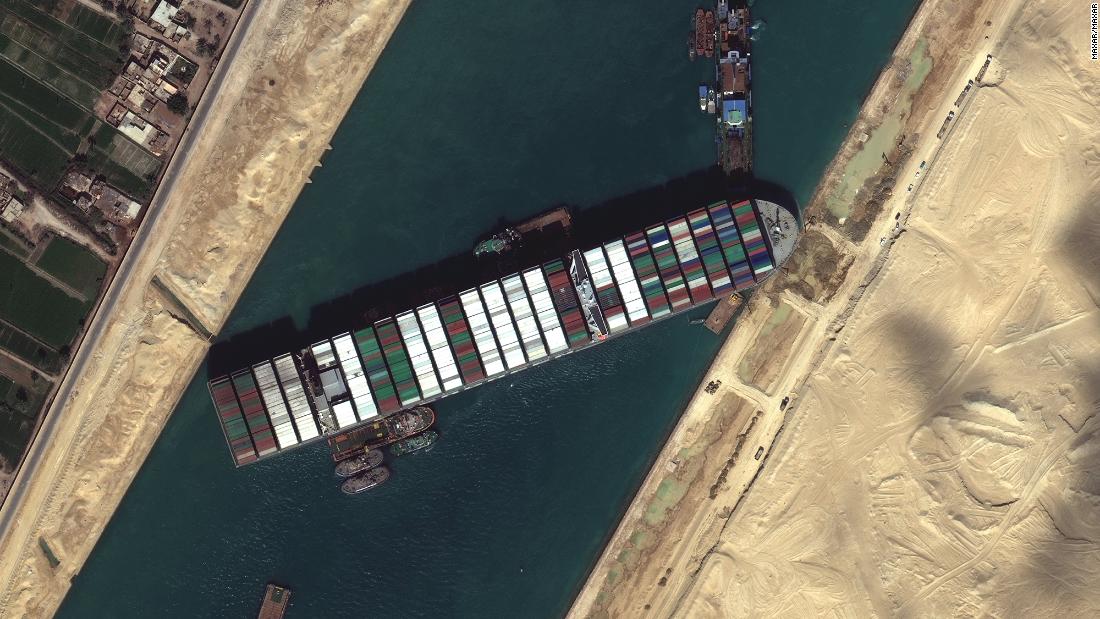
Meanwhile, the delay of ships waiting for vital Egyptian waterway traffic has increased to 326, according to agencies Leth, the channel’s service provider.
Syria’s Ministry of Petroleum and Mineral Resources said the blockade of the Suez Canal “made it difficult to supply oil to Syria and delayed the arrival of an oil tanker transporting oil and oil derivatives to Syria,” the SANA state news.
Amid fears over fuel supply, the Middle Eastern nation has been forced to ration “available quantities of petroleum products mainly diesel and benzene to ensure their vital availability for as long as possible,” he said. SANA Saturday.
The move has been made “to ensure the continued provision of basic services to Syrians such as bakeries, hospitals, water stations, communication centers and other vital institutions,” according to SANA, the ministry is quoted as saying.
Syria will continue to ration oil supplies until “the return of the normal movement of navigation across the Suez Canal, which may take an unknown time,” he added.
The Ever given, a huge ship almost as long as the Empire State Building is high, ran aground on the Egyptian Channel on Tuesday after being caught by 40-knot winds and a sandstorm. Authorities are also investigating possible human or technical errors.
The blockade, on one of the busiest and most important waterways in the world, could have a major impact on the already stretched global supply chains, with the interruption of each passing day.
A team of expert rescuers from the Dutch company SMIT Salvage and the Japanese Nippon Salvage, who have worked in several high-profile operations in the past, has been appointed to help the Suez Canal Authority re-float the ship, the Evergreen Marine charter company said in a statement.
At a press conference on Saturday, SCA President Osama Rabie gave details of the rescue operation, which he described as “technically difficult” and “involving many factors”.
“We are facing a difficult and complicated situation, we are working on rocky ground, the tides are very high, in addition to the huge size of the ship and the number of containers that make it difficult,” he said. “We can’t set a specific date for the ship to float, it depends on the ship’s response.”
About 9,000 tons of ballast water have been removed from the ship, Rabie said, with dredging occurring during low tides while 14 tugs operated during high tides. Rescue crews were able to temporarily restart the rudder and propellers Friday night before a low tide stopped their efforts, he said.
According to the ship’s technical manager, Bernhard Schulte Shipmanagement, two additional tugs are expected to arrive by Sunday to assist in the re-floating efforts.
If efforts to evacuate the ship by dredging and tugs fail, the next step may be to lighten the ship’s load by removing containers, a time-consuming process that should not go “luckily”. said Rabie.
Rabie said the reasons for the crash are still unclear. “There are many factors or reasons, fast winds and sandstorm could have been one reason, but not the main reason: it could have been a technical error or a human error,” he said. “There will be more research.”
Meanwhile, billions of dollars in vital cargo and sensitive products are left behind on the hundreds of ships that have the road blocked. A dozen of them carry cattle.
The director of the EU’s NGO Animals International, Gabriel Paun, warned that thousands of animals transported on ships – mostly Romanians – could be at risk of death if the situation is not resolved in the coming days.
CNN’s Magdy Samaan reported on Cairo and Mohammed Tawfeeq on Baghdad, while Laura Smith-Spark wrote from London. CNN’s Mostafa Salem contributed to this report.